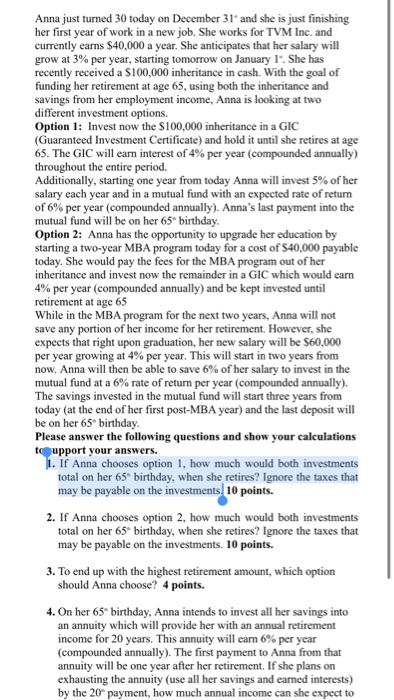Question 1 about Investment

Anna just turned 30 today on December 31 and she is just finishing her first year of work in a new job. She works for TVM Inc. and currently earns $40,000 a year. She anticipates that her salary will grow at 3% per year, starting tomorrow on January 1. She has recently received a $100,000 inheritance in cash. With the goal of funding her retirement at age 65 , using both the inheritance and savings from her employment income, Anna is looking at two different investment options. Option 1: Invest now the $100,000 inheritance in a GIC (Guaranteed Investment Certificate) and hold it until she retires at age 65. The GIC will earn interest of 4% per year (compounded annually) throughout the entire period. Additionally, starting one year from today Anna will invest 5% of her salary each year and in a mutual fund with an expected rate of return of 6% per year (compounded annually). Anna's last payment into the mutual fund will be on her 652 birthday. Option 2: Anna has the opportunity to upgrade her education by starting a two-year MBA program today for a cost of $40,000 payable today. She would pay the fees for the MBA program out of her inheritance and invest now the remainder in a GIC which would earn 4% per year (compounded annually) and be kept invested until retirement at age 65 While in the MBA program for the next two years, Anna will not save any portion of her income for her retirement. However, she expects that right upon graduation, her new salary will be $60,000 per year growing at 4% per year. This will start in two years from now. Anna will then be able to save 6% of her salary to invest in the mutual fund at a 6% rate of return per year (compounded annually). The savings invested in the mutual fund will start three years from today (at the end of her first post-MBA year) and the last deposit will be on her 65 birthday. Please answer the following questions and show your calculations te upport your answers. 1. If Anna chooses option 1, how much would both investments total on her 65 birthday, when she retires? Ignore the taxes that may be payable on the investments. 10 points. 2. If Anna chooses option 2, how much would both investments total on her 65 birthday, when she retires? Ignore the taxes that may be payable on the investments. 10 points. 3. To end up with the highest retirement amount, which option should Anna choose? 4 points. 4. On her 65 birthday, Anna intends to invest all her savings into an annuity which will provide her with an annual retirement income for 20 years. This annuity will earn 6% per year (compounded annually). The first payment to Anna from that annuity will be one year after her retirement. If she plans on exhausting the annuity (use all her savings and earned interests) by the 20 payment, how much annual income can she expect to








